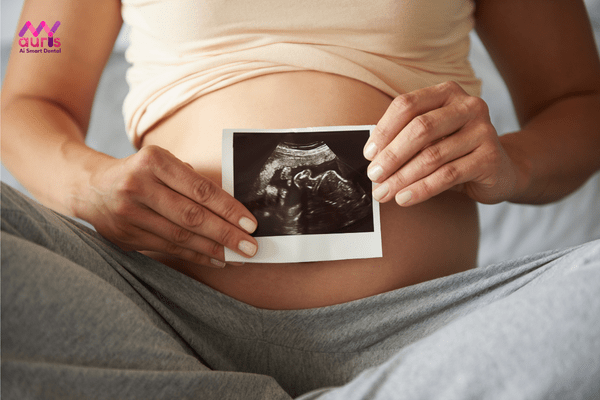During pregnancy, not only must ensure safety for the fetus, but mothers must also ensure adequate nutrition for the fetus to grow and develop best. To know how to adjust diet and rest so that your baby develops well, mothers can rely on the data on the fetal weight chart by week of age. Below is some related information as well as details about thefetal weight chart for mothers to refer to.
How to measure fetal length and weight
Depending on the health and condition of the fetus, each baby has a different growth rate. The average weight of a fetus before full term is about 3.5kg and the average length is about 51.2cm. Therefore, based on data on the weight and length of the fetus, it is possible to evaluate whether the growth and development speed is good and uniform.
- In the 1st trimester (first 3 months of pregnancy): the baby’s length will be measured from head to rump called CRL (crown-rump length). At this stage, the fetus is still very small so it is difficult for doctors to determine the weight.
- In the 2nd trimester (the second 3 months of pregnancy): when examining the fetus, the doctor will measure the parameters of diameter at the top of the head, waist circumference and length of the femur. This helps the doctor determine the weight of the fetus.
- In the 3rd trimester (last 3 months of pregnancy): besides the parameters like the second trimester, the doctor also performs a number of other parameters to calculate the baby’s weight. The weight of the fetus will grow rapidly starting from week 32.

Fetal weight table according to standards
The time from weeks 1-7 is the time when the embryo is formed and completed, so the weight of the fetus is not calculated. Therefore, fetal weight chart will be calculated from the 8th to the 40th week
| Gestational age weeks Pediatrics | Weight (grams) |
| Week 8 | 1 gram |
| 9th week | 2 grams |
| 10th week | 4 grams |
| Week 11 | 7 grams |
| Week 12 | 14 grams |
| Week 13 | 23 grams |
| Week 14 | 43 grams |
| Week 15 | 70 grams |
| 16th week | 100 grams |
| 17th week | 140 grams |
| 18th week | 190 grams |
| Week 19 | 240 grams |
| 20th week | 300 grams |
| Week 21st | 360 grams |
| 22nd week | 430 grams |
| Week 23 | 501 grams |
| 24th week | 600 grams |
| Week 25 | 660 grams |
| 26th week | 760 grams |
| Week 27th | 875 grams |
| Week 28 | 1005 grams |
| Week 29 | 1153 grams |
| 30th week | 1319 grams |
| Week 31 | 1502 grams |
| Week 32 | 1702 grams |
| Week 33 | 1918 grams |
| 34th week | 2146 grams |
| Week 35 | 2383 grams |
| Week 36 | 2622 grams |
| Week 37 | 2859 grams |
| Week 38 | 3083 grams |
| Week 39 | 3288 grams |
| Week 40 | 3462 grams |
Fetal weight table by week of gestational age
Benefits of monitoring weight fetus
Providing a fetal weight table helps parents monitor and compare the numbers with their child’s results. From there, it is possible to monitor and understand possible risks to the fetus:
- Overweight fetus: this is a condition that not only makes it difficult for the mother to give birth but can also damage the mother’s reproductive organs, such as causing uterine rupture during birth. Therefore, overweight babies are rarely born naturally and must be delivered by cesarean section. At the same time, the baby will also encounter some problems when born such as: hypoglycemia leading to failurerespiratory failure, circulatory failure, heart failure, hypothermia,… even life-threatening cases. More dangerously, the born baby must live with diseases such as diabetes, cardiovascular disease, depression, etc. Therefore, weight monitoring based on the fetal weight chart helps mothers adjust their diet more appropriately, avoiding exceeding the allowed weight.
- Underweight fetus: the mother’s poor nutrition can cause the fetus to be underweight, which reduces blood flow to the fetus. Therefore, the fetus will not be able to get other necessary nutrients. In this condition, the fetus can suffocate, lack oxygen, or even die. When these babies are born, they may suffer from pneumonia, hypoglycemia, polycythemia vera, etc. Some babies also experience developmental delays and lower IQ than other children.

Factors affecting fetal weight fetus
After looking up the fetal weight table and comparing it with the results of the prenatal examination, most mothers wonder why each child is different in weight and development. Because the weight and development of the fetus also depends on the following factors:
- Genetic factors: genetic factors affect 60-70% of the fetus’s body
- Health and weight of pregnant mothers: For mothers with diabetes and obesity during pregnancy, the child’s weight is affected. The baby is born with a weight greater than the normal standard weight chart.
- Nutrition and rest of the pregnant mother: are very important factors affecting the development of the fetus. If the mother is deficient in nutrients, the fetus will not reach the standard fetal weight chart and cannot develop optimally. If mothers gain too much weight, the baby will grow quickly and have a large weight. Therefore, throughout pregnancy, doctors advise mothers to have a suitable and scientific diet.
- Number of fetuses: In case mothers are pregnant with twins or multiples, the length and weight parameters may be lower than the standard fetal weight table.
- Birth order: normally, the second child will have a greater weight than the first child, but if the birth distance between the two children is close, the second child will have a lower weight than the first child.

What pregnant mothers need to do to help the fetus reach the target weight standard?
In case the fetus is overweight:
- Adjust your daily diet: you should add low-calorie foods, combined with lots of fruits and vegetables. Some vegetables: apples, strawberries, broccoli, spinach,…
- Limit eating foods rich in starch and sugar such as cakes, candy, carbonated soft drinks,…
- Dividing meals into small meals: helps the digestive system work better and absorb all nutrients without excess.
- Regularly exercise: pregnant mothers should lightly exercise for about 30 minutes/day from the 29th week of pregnancy to speed up the metabolism and quickly convert fat and calories into energy. At the same time, exercise helps pregnant mothers give birth more easily.
- Weight control: mothers should check the weight of themselves and their fetus regularly and monitor fetal weight chart to adjust and control weight at an appropriate level.

In case the fetus is underweight:
- It is necessary to pay attention to adequate and diverse food supplementation so that the fetus is provided with the necessary nutrients. Meals should also be divided into small meals so that the fetus can absorb nutrients better.
- Mothers should supplement foods rich in protein so that the fetus can gain weight evenly, be strong and healthy. Some foods rich in protein that are good for pregnant mothers: broccoli, spinach, avocado, bananas, salmon, beef, eel,…
- Mothers should spend a lot of time resting, avoid working, thinking too much, and should sleep early.
- Supplement essential vitamins and minerals for the fetus such as iron, folic, DHA, calcium,…
- Avoid stimulants such as alcohol, beer, cigarettes, etc. because they slow down the development of the fetus.
- Regular health checks and examinations throughout pregnancy

Through the information about the article that My Auris dentistry shares, we hope that mothers will understand the necessary factors to improve the health and weight of their children. Wishing mothers a healthy pregnancy, full of nutrients for the baby’s comprehensive development.
Anh Thy





